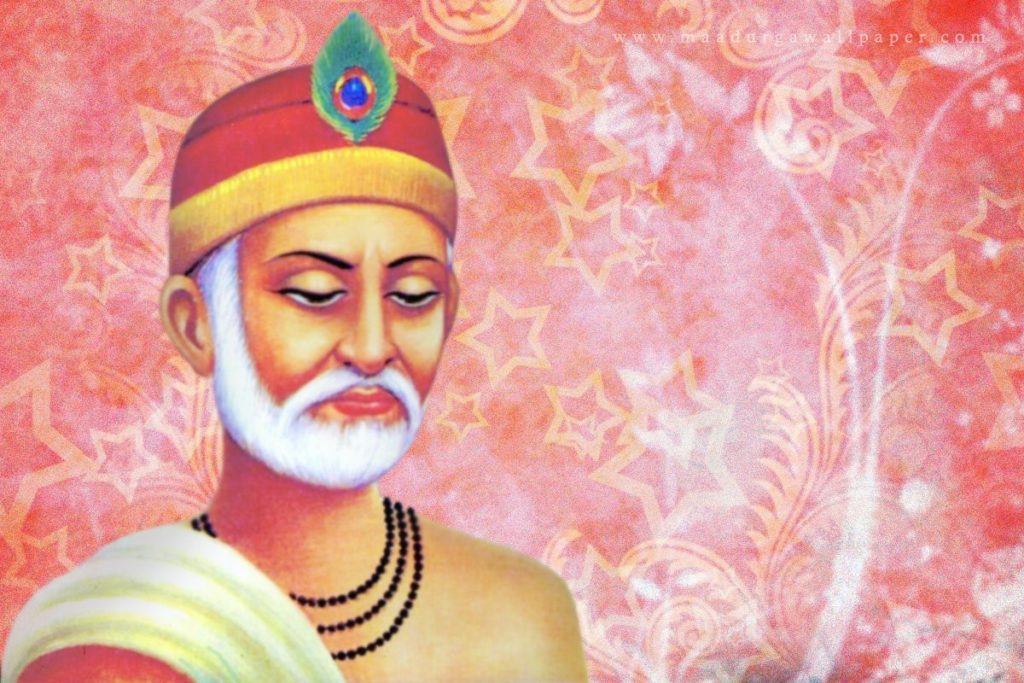
Why We Love Guru Kabir (And You Should, Too!)
Guru Kabir was contemporary of Guru Ravidas and was at the forefront of the Bhakti movement in the 15th century. He was born into a low caste weaver family in Banaras.
Guru Kabir is known for being critical of both Hinduism and Islam, stating that the former were misguided by the Vedas and the latter by the Quran, and questioning their meaningless rites of initiation such as the sacred thread and circumcision respectively.
Here are a few of the poems, verses, quote by Guru Kabir. These are the reason we love Guru Kabir –
—
The idol was made by chiselling stone;
often the sculptor put his foot on its chest.
If this idol were real it would have devoured,
the sculptor.
(Source – Songs of Kabir from the Adi Granth, the holy book of the Sikhs, translation and introduction by Nirmal Dass)
—
If by worshipping stones one can find God, I shall worship a mountain: better than these stones (idols) are the stones of the flour mill with which men grind their corn.
(Source – Kabir and Kabir Panth by Rev. G. H. Westcott)
—
Chhode ann kare pakhand,
Na oh suhagan na oh rand.
– Guru Kabir
(Page 873, Sri Guru Granth Sahib)
Meaning – One who discards the grain, is practicing hypocrisy. She is neither a happy soul-bride, nor a widow.
It is especially for women who fast on Karva Chauth!
—
Tell me, O Pandit, O religious scholar: since when have you been a Brahmin? Don’t waste your life by continually claiming to be a Brahmin. If you are indeed a Brahmin, born of a Brahmin mother, then why didn’t you come by some other way? How is it that you are a Brahmin, and I am of a low social status? How is it that I am formed of blood, and you are made of milk? – Guru Kabir (Sri Guru Granth Sahib, Page 324)
—
Guru Kabir didn’t hesitate to call Brahmins as wretched criminals of all 4 yugas. He said, “Charon yug Brahman khote.”
—
Kabir is so scathing about the claimed authority of Brahmans that it is hard to imagine him seeking out a Brahman guru:
Saints, the Brahmin is a slicked-down butcher.
He slaughters a goat and rushes for a buffalo
without a twinge of pain in his heart.
He lounges after his bath, slaps sandal paste
on his brow, does a song and dance
for the Goddess, crushes souls in the wink of an eye–
the river of blood flows on.
How holy! What a superior race! What authority
in society, and how people grovel to get his initiation!
It makes me laugh.
They tell tales about ending sin
but their actions are base.
I’ve seen two of them throttle each other,
but Yama carted off both.
Kabir says, saints, this is Kaliyug:
the age of phoney Brahmins
—
This is the big fight, Raja Ram.
He who settles it is free from bonds
Is Brahma bigger or where he came from?
Is the Veda bigger or where it was born from?
Is the mind bigger or what it believes in?
Is Ram bigger or the knower of Ram?
Kabir turns round, it’s hard to see,
Is the holy place bigger or the devotee?
—
Pandit, you’ve got it wrong.
There’s no creator or creation there,
no gross or fine, no wind or fire,
no sun, moon, earth or water, no radiant form,
no time there, no word, no flesh, no faith,
no cause and effect, nor any thought
of the Veda. No Hari or Brahma,
no Siva or Sakti, no pilgrimage
and no rituals. No mother, father
or guru there. Is it two or one?
Kabir says, if you understand now,
you’re guru, I’m disciple.
Source – “Buddhism in India: Challenging Brahmanism and Caste” by Gail Omvedt
Read also – Kabir: Pandit, You’ve Got it Wrong
Brahmins’ logic was whosoever dies at Banaras get salvation. Guru Kabir lived there throughout his life. At the end of his life, Guru Kabir retired from Banaras to live in the small town of Magahar, near Gorakhpur. He moved there because he wanted to affront pious Hindu sensibilities that considered Magahar as unholy and Banaras holy! Guru Kabir died in Magahar around 1470.
Guru Kabir challenged Brahmins and Brahminism at each and every step during his time and that’s why we love him! What are your views? Let us know in the comments.



संत कबीरजी ब्राह्मण वेदों के बारे में जो कहा सही है क्यों कि आज भी हम देख रहे है की हिन्दु के कुछ वर्ग अपने अापको सभी दुसरे से उप्र समजते है.लेकीन क़ुरआन के बारे टिप्पणी करना क़ुरआन से नावाकेफीयत है.अगर क़ुरआन के बारे में अभ्यास कीया होता तो जरुर कुरआन के बारे में टिप्पणी न करते.
.After Buddha, the great rationalist, Bhakti movement rationalist were Guru Nanak, Sant Kabeer and Guru Ravi Dass ji and in the modern times it is Dr. Ambedkar.